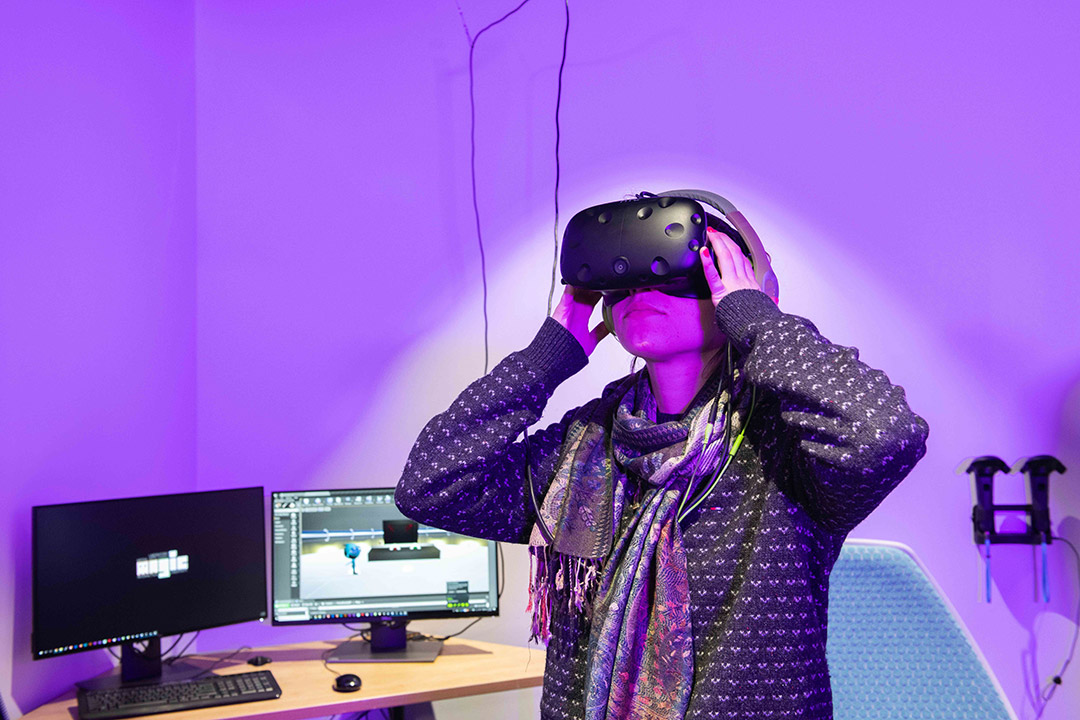AI summit brings together an exciting range of research underway
Multidisciplinary projects across campus focus on artificial intelligence applied to human-centered solutions
RIT researchers and scientists are developing artificial intelligence systems and applications such as virtual reality headsets. Many of the current projects and initiatives will be highlighted at the upcoming AI@RIT Summit taking place on Oct. 6 and 7.
Applications being developed at RIT using artificial intelligence vary from sophisticated medical monitoring devices to the development of autonomous systems for Indy racecars.
These represent some of the exciting and complex work underway at the university that will be featured prominently at the AI@RIT Summit: Discovering and Harnessing the Breadth and Depth of Artificial Intelligence at RIT.
Taking place Oct. 6 and 7 at RIT’s MAGIC Spell Studios, the AI Summit will showcase the broad range of artificial intelligence initiatives across the university. Registration is open for faculty, staff, undergraduates, and graduate students. Over the two days, participants will have access to tutorials and panel presentations aimed toward building a larger community of AI researchers. Discussions will also focus on how AI is being integrated into coursework and on setting strategic goals about the university’s future direction and leadership in this area.
“We have a large and diverse set of researchers using and developing artificial intelligence tools that literally span the entire academic landscape at RIT,” said Ryne Raffaelle, RIT’s associate provost and vice president for research. “The goal of this summit is to bring the entire community together to share and learn from one another about all aspects of AI.”
Over the first day of the summit, tutorials will consist of fundamentals of AI such as: understanding what AI encompasses; what is machine learning and computer vision; and how AI is being integrated into systems such as game design, health monitoring, and autonomous vehicle development.
In a 2022 report by the Pew Research Center, Americans are generally positive about how AI is being applied but also concerned about how it can improve society. Participants in RIT’s summit will learn about how AI technology systems are being developed but also how these systems enable ethical, social justice, and environmental aspects of society today—and RIT’s role in advancing these technologies.
A small sample of those advances led by RIT researchers include, but are not limited to:
- Cecilia Alm, an associate professor in RIT’s College of Liberal Arts, was awarded nearly $2 million by the National Science Foundation to lead AI-AWARE, a team of RIT faculty addressing a lack of diversity in the artificial intelligence research community and gaps in AI curricula.
- Rui Li, an assistant professor in RIT’s Ph.D. program in computing and information sciences, received a NSF Faculty Early Career Development (CAREER) award to develop machine intelligence that can actually grow when given new information.
- GCCIS Professor Matthew Wright and John Sohrawardi, a GCCIS doctoral candidate, are developing tools to understand how deep learning, a facet of AI, is being used to create fake videos and images.
A schedule of sessions is available for the AI@RIT Summit taking place from 1:30 to 4:30 p.m. on Oct. 6 at MAGIC’s Wegmans Theater, and from 9 a.m. to 4 p.m. on Oct. 7 at MAGIC’s Sound Stage.








